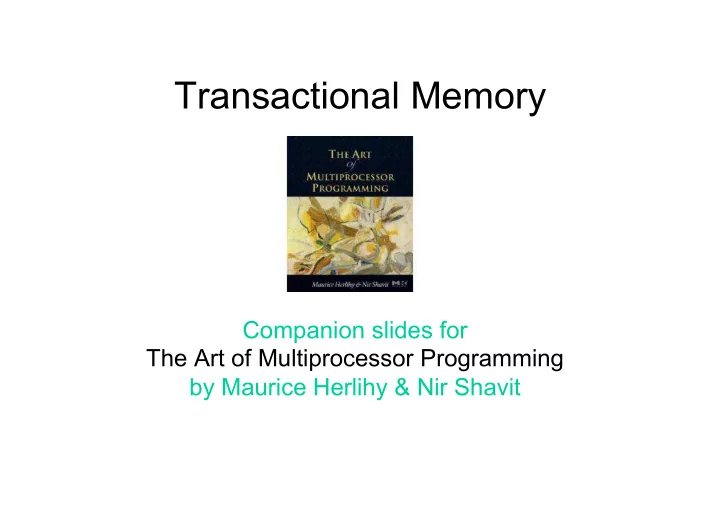

Processor Issues Load Request load x E cache cache cache Bus Bus Got it! memory data data 57 Art of Multiprocessor Programming
Processor Issues Load Request Load x E data cache cache Bus Bus memory data 58 Art of Multiprocessor Programming
Other Cache Responds Got it S S E data data cache cache Bus Bus memory data 59 Art of Multiprocessor Programming
Modify Cached Data S S data data data cache Bus memory data 60 Art of Multiprocessor Programming
Invalidate Invalidate x S S M I data data cache cache Bus Bus memory data 61 Art of Multiprocessor Programming
Invalidate data cache cache Bus This cache acquires write permission memory data 62 Art of Multiprocessor Programming
Invalidate Other caches lose read permission data cache cache Bus This cache acquires write permission memory data 63 Art of Multiprocessor Programming
Invalidate Memory provides data only if not present in any cache, so no need to change it now (expensive) data cache cache Bus memory data 64 Art of Multiprocessor Programming
HW Transactional Memory read active T caches Interconnect memory Art of Multiprocessor 65 65 Programming
Transactional Memory active read active T T caches memory Art of Multiprocessor 66 66 Programming
Transactional Memory active committed active T T caches memory Art of Multiprocessor 67 67 Programming
Transactional Memory write committed active T D caches memory Art of Multiprocessor 68 68 Programming
Rewind write aborted active active T T D caches memory Art of Multiprocessor 69 69 Programming
Transaction Commit At Commit point … No cache conflicts? We win. Mark transactional cache entries … . Was: read-only, Now: valid Was: modified, Now: dirty (will be written back) That’s (almost) everything! Art of Multiprocessor 70 70 Programming
Road Map Transactional Memory Hardware Transactional Memory Hybrid Transactional Memory Software Transactional Memory Research Questions 71
Hardware Transactional Memory (HTM) IBM’s Blue Gene/Q & System Z & Power8 Intel’s Haswell TSX extensions 72
Intel RTM if (_xbegin() == _XBEGIN_STARTED) { speculative code _xend() } else { abort handler }
Intel RTM if (_xbegin() == _XBEGIN_STARTED) { speculative code _xend() } else { abort handler } start a speculative transaction
Intel RTM if (_xbegin() == _XBEGIN_STARTED) { speculative code _xend() } else { abort handler } If you see this, you are inside a transaction
Intel RTM if (_xbegin() == _XBEGIN_STARTED) { speculative code _xend() If you see anything else, } else { your transaction aborted abort handler }
Intel RTM if (_xbegin() == _XBEGIN_STARTED) { speculative code _xend() } else { abort handler } you could retry the transaction, or take an alternative path
Abort codes if (_xbegin() == _XBEGIN_STARTED) { speculative code } else if (status & _XABORT_EXPLICIT) { aborted by user code } else if (status & _XABORT_CONFLICT) { read-write conflict } else if (status & _XABORT_CAPACITY) { cache overflow } else { … }
Abort codes if (_xbegin() == _XBEGIN_STARTED) { speculative code } else if (status & _XABORT_EXPLICIT) { aborted by user code } else if (status & _XABORT_CONFLICT) { read-write conflict } else if (status & _XABORT_CAPACITY) { speculative code can call cache overflow } else { _xabort() … }
Abort codes synchronization conflict if (_xbegin() == _XBEGIN_STARTED) { speculative code occurred (maybe retry) } else if (status & _XABORT_EXPLICIT) { aborted by user code } else if (status & _XABORT_CONFLICT) { read-write conflict } else if (status & _XABORT_CAPACITY) { cache overflow } else { … }
Abort codes if (_xbegin() == _XBEGIN_STARTED) { speculative code } else if (status & _XABORT_EXPLICIT) { read/write set too big aborted by user code (maybe don’t retry) } else if (status & _XABORT_CONFLICT) { read-write conflict } else if (status & _XABORT_CAPACITY) { cache overflow } else { … }
Abort codes if (_xbegin() == _XBEGIN_STARTED) { speculative code } else if (status & _XABORT_EXPLICIT) { aborted by user code } else if (status & _XABORT_CONFLICT) { other abort codes … read-write conflict } else if (status & _XABORT_CAPACITY) { cache overflow } else { … }
Too Big Transaction aborts if data set overflows caches, internal buffers
Too Slow Transaction aborts on timer interrupt
Just Not in the Mood Many other reasons: TLB miss, illegal instruction, page fault …
Hybrid Transactional Memory
Non-Speculative Fallback if (_xbegin() == _XBEGIN_STARTED) { read lock state if (lock taken) _xabort(); work; _xend() } else { lock->lock(); work; lock->unlock(); }
Non-Speculative Fallback if (_xbegin() == _XBEGIN_STARTED) { read lock state if (lock taken) _xabort(); work; _xend() } else { reading lock ensures that lock->lock(); transaction will abort if another work; thread acquires lock lock->unlock(); }
Non-Speculative Fallback if (_xbegin() == _XBEGIN_STARTED) { read lock state if (lock taken) _xabort(); work; _xend() } else { lock->lock(); abort if another thread has work; acquired lock lock->unlock(); }
Non-Speculative Fallback on abort, acquire lock & do work (aborting concurrent speculative if (_xbegin() == _XBEGIN_STARTED) { transactions) read lock state if (lock taken) _xabort(); work; _xend() } else { lock->lock(); work; lock->unlock(); } Art of Multiprocessor Programming
Lock Elision <HLE acquire prefix> lock(); do work; <HLE release prefix> unlock() 91 Art of Multiprocessor Programming
Lock Elision <HLE acquire prefix> lock(); do work; <HLE release prefix> unlock() first time around, read lock and execute speculatively 92 Art of Multiprocessor Programming
Lock Elision <HLE acquire prefix> lock(); do work; <HLE release prefix> unlock() if speculation fails, no more Mr. Nice Guy, acquire the lock 93 Art of Multiprocessor Programming
Conventional Locks lock transfer latencies serialized execution locks 94 Art of Multiprocessor Programming
Lock Elision locks lock elision 95 Art of Multiprocessor Programming
Lock Teleportation 96
Hand-over-Hand locking a b c Art of Multiprocessor 97 Art of Multiprocessor Programming Programming
Hand-over-Hand locking a b c 98 Art of Multiprocessor Programming
Hand-over-Hand locking a b c 99 Art of Multiprocessor Programming
Hand-over-Hand locking a b c 100 Art of Multiprocessor Programming
Recommend
More recommend